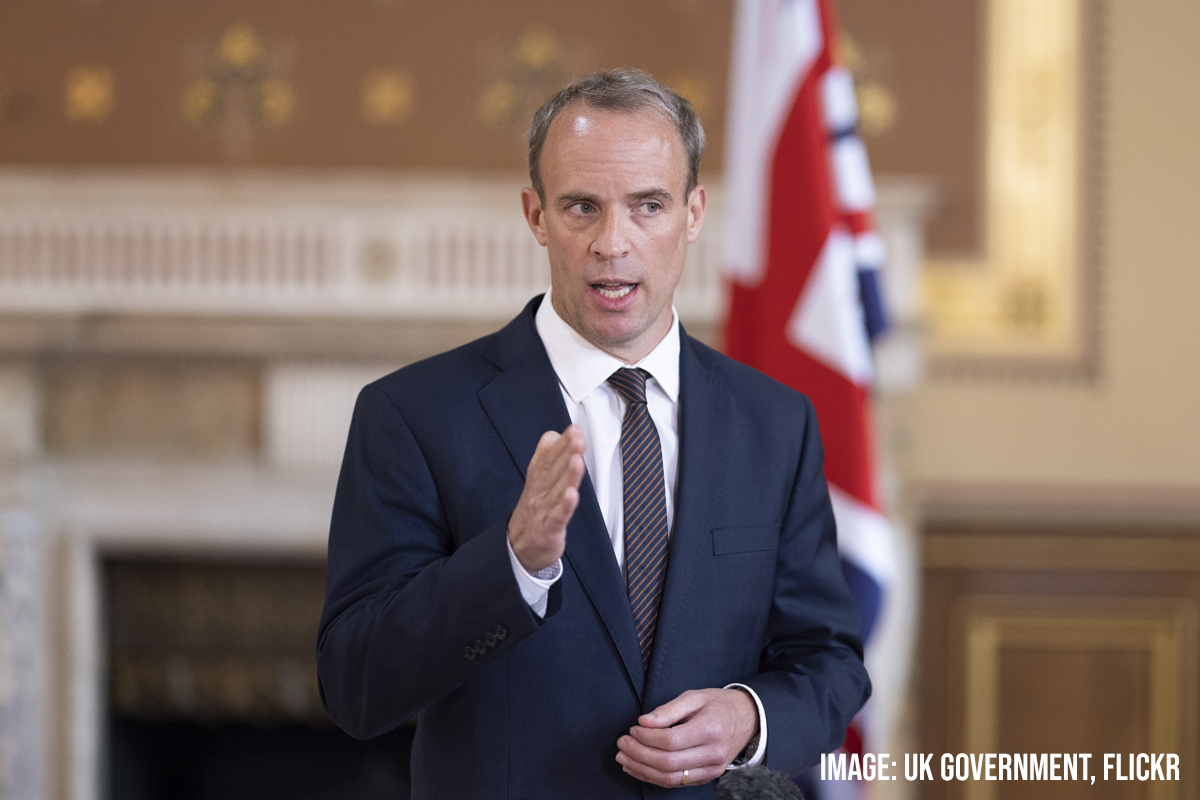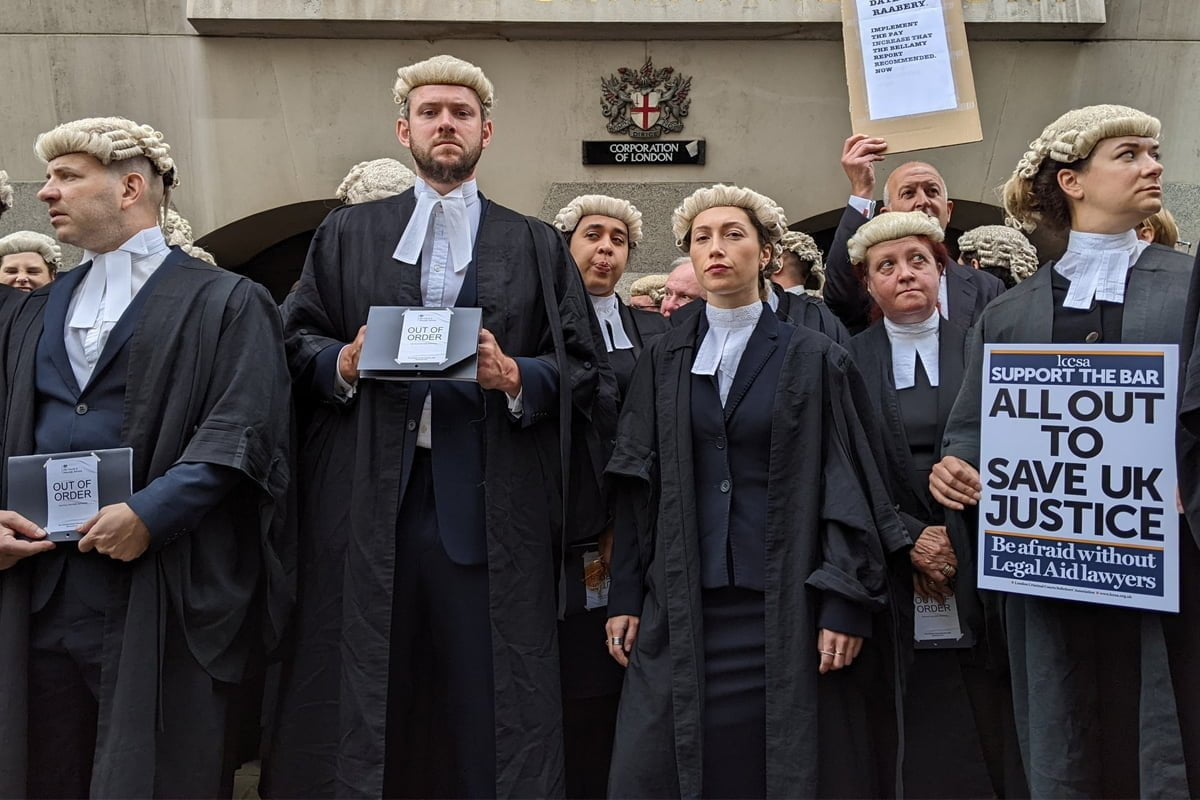Criminal barristers have voted to escalate their ongoing action into an indefinite strike from next month. To win, barristers must link their fight against legal aid cuts with the rest of the struggles breaking out across the labour movement.
For just over a month, criminal legal aid barristers have been participating in strike action on alternate weeks, in protest at the ongoing underfunding of the criminal justice system and the low fees paid to barristers for their work.
This already represented a significant step for barristers, who – prior to the current action – had only been on ‘strike’ (for one afternoon) in the near 500 year history of the profession.
Barristers are also self-employed. This means the current action is effectively a ‘wildcat’ strike, which could result in professional and financial consequences for those involved.
Nevertheless, at the weekend, almost 80% of Criminal Bar Association (CBA) members voted to escalate the walkouts into indefinite strike action, whilst also continuing in their refusal to take on any new cases.
The impact of the strikes has already begun to be felt in the criminal courts, with the backlog of cases slowly rising.
With barristers now effectively downing tools until further notice, courts will largely grind to a halt, bringing yet more chaos for the Tory government.
Criminal justice crisis
The strike is not just about pay, but the entire future of the justice system.
Since the Tories began savaging public services with the onset of their austerity programme in 2010, hundreds of courts have closed; the criminal legal aid budget has fallen by nearly a third; the average waiting time for a case to go to trial has significantly increased; and the number of barristers and solicitors undertaking criminal legal aid work has plummeted, with a quarter of all criminal barristers stopping doing criminal law work in the last six years alone.
Junior barristers are paid an average of £12,200 in the three years after qualifying, despite accumulating significant debts while studying. In a literal sense, many junior barristers will struggle to afford to go on an indefinite strike.
But the general feeling amongst barristers is that they cannot afford not to strike, if the criminal bar is to survive, given the extent of the crisis and the exodus from the profession.
Tory lies

As has been the case with the recent rail strikes, the Tory government has attempted to use divide and rule tactics: dismissing the criminal bar as a well-paid profession, and accusing striking barristers of greedily rejecting a 15% pay rise.
In response to the vote for all-out strike action, for example, Tory justice secretary Dominic Raab outrageously tried to claim that “justice is being held to ransom”, whilst crying crocodile tears about the impact of the strike on the victims of crime.
This, of course, could not be further from the truth. In fact, the 15% increase in fees was recommended by the government’s own review in 2019, quoted as the minimum needed to prevent an immediate collapse of the justice system.
Furthermore, this pay increase only applies to new cases from this autumn, and will therefore not have any impact on barristers’ incomes until next year at the earliest.
In addition, it does not account for the recent spike in inflation. As a result, the CBA have correctly called for an immediate 25% increase in all fees, paid for all current and future cases.
It is ironic that Raab accuses barristers of holding justice to ransom, as he has even stubbornly refused to meet with the CBA to discuss how to resolve the dispute.
Those on strike do not do so light-mindedly. Many barristers have had to agonise over taking part in the action, given the impact on victims and clients.
But they also recognise that the impact from not fighting for the future of the criminal justice system will be far greater, with even greater delays and many more barristers inevitably leaving the criminal bar, unless this fight is won.
Solidarity and support
Despite these attempts by the Tories to divide the criminal bar and turn the public against the strike, barristers have remained firm. In fact, a higher number of CBA members voted to escalate the action than voted to begin the action back in June.
The threats of professional disciplinary action also seem to have largely been hot air from the government, with the number of barristers participating in the action seemingly taking them by surprise.
Interestingly, a significant number of judges are also rumoured to be privately sympathetic and supportive of the striking barristers. In the words of one anonymous circuit judge: “We stand behind you and hope that you achieve your aim.”
Class struggle
Throughout the walkout, criminal barristers have increasingly been seen as part of the labour movement, and have been drawn closer to the rest of the organised working class.
Activists from unions such as the RMT have attended the lawyers’ rallies in solidarity, and barristers are increasingly seeing themselves as part of the wider class struggle against the Tory government.
In the justice system alone, both security staff and magistrates’ legal advisors – represented by the PCS union – have overwhelmingly voted in favour of strike action.
The escalated action by barristers presents a perfect opportunity to unite with these workers, and with criminal legal aid solicitors, in order to win the fight against the cuts to the justice system.
United fightback

But the reality is that the underfunding and cuts to public services goes much further than the justice system. From local government workers to NHS staff to teachers: the anger is increasing and the fightback is beginning.
The CBA must reach out to the wider labour movement and seek to coordinate all these struggles, in order to reverse years of austerity.
Ultimately, this can only be done on the basis of clear socialist policies, which make the billionaires, bosses, and bankers pay for this crisis.
The money exists to fully fund all public services – including the justice system. But it sits in the bank accounts of the super-rich and big business.
We must unite and fight to expropriate this obscene wealth, and use it to provide the resources necessary for the justice system, healthcare, education, housing, and the provision of quality public services for all.






